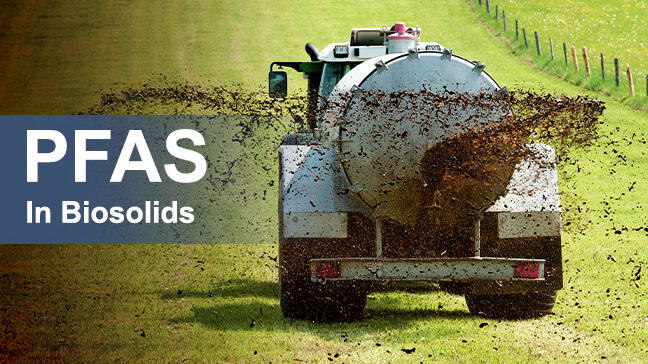Click "Allow Cookies" to consent to storing cookies on your device to improve your experience on our site. Learn more.
PFAS Pollutants in Biosolids


September 5th, 2024
Biosolids contaminated with Per- and Polyfluoroalkyl Substances (PFAS), known as “forever chemicals” due to their environmental persistence, pose a major risk to both farmers and consumers as they may pollute soil, underground water, and crops. Learn about biosolids contamination, current regulations, and how AccuStandard can help.
What are Biosolids and how are they contaminated with PFAS?
Biosolids are a nutrient-rich, semisolid, organic matter created during the wastewater treatment process of sewage sludge. They are commonly used in agricultural applications as a fertilizer to help improve the quality of soil.
PFAS contamination in biosolids occurs when residential and industrial wastewater discharge sources containing PFAS are processed through wastewater treatment plants. Although wastewater processes include the treatment of pathogenic matters, heavy metals and other contaminants, the treatment and removal of PFAS is yet to be integrated to become part of these processes. This may cause high concentrations of these “forever chemicals” to pass through the treatment process into the finished biosolids.
Are there regulations for PFAS in Biosolids?
Currently, there are no regulations that set the limits for PFAS in biosolids, however, the USEPA is conducting a risk assessment for perfluorooctanoic acid (PFOA) and perfluorooctane sulfonic acid (PFOS) in biosolids with expected results to be published by the end of 2024.
Some states, such as Maine, have banned the use of PFAS contaminated biosolids in all agricultural applications to prevent the spread of these toxic chemicals. Additionally, standardization bodies including the USEPA and ASTM have published test methods to help quantify PFAS contaminants in biosolids.
How can AccuStandard help?
AccuStandard offers a large selection of high purity Chemical Reference Materials (CRMs) to help your lab test for these dangerous and ubiquitous chemicals in biosolids reliably and accurately. Our CRMs include mixes for USEPA Method 1633 and ASTM Test Method D8535 as well as a comprehensive selection of single component standards for Perfluoroalkyl sulfonates, Polyfluoroalkyl phosphate esters (PAPs) and many others.
EPA Method 1633 Standards
ASTM 8535 Standards
Need Assistance with PFAS Standards?
To find additional PFAS Standards, you can shop our full selection here.
If you still don’t see what you are looking for, reach out to techservice@accustandard.com and we can make a recommendation or create a custom product for you.
